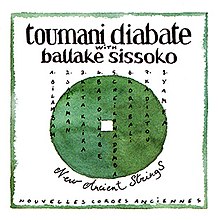| New Ancient Strings | ||||
|---|---|---|---|---|
 | ||||
| Studio album by | ||||
| Released | 22 June 1999 | |||
| Recorded | 22 September 1997 | |||
| Studio | Palais des Congrès[a] Bamako, Mali | |||
| Genre | Mande music | |||
| Length | 53:20 | |||
| Label | Hannibal | |||
| Producer | Lucy Durán | |||
| Toumani Diabaté chronology | ||||
| ||||
| Ballaké Sissoko chronology | ||||
| ||||
New Ancient Strings (French: Nouvelles cordes anciennes) is a studio album by the Malian musicians Toumani Diabaté and Ballaké Sissoko, released on 22 June 1999 by the British label Hannibal Records. The album comprises eight instrumental duets composed by Diabaté for kora, a stringed instrument of West African music. Diabaté and Sissoko are esteemed as the best and the second-best kora players of their generation, respectively. Their duets were recorded in a single live take within a marble hallway of Bamako's conference centre on the night of 22 September 1997, coinciding with Mali's Independence Day.
New Ancient Strings was inspired by the 1970 album Ancient Strings, a landmark kora album featuring the musicians' fathers, Sidiki Diabaté and Djelimadi Sissoko. By the mid-1990s, Toumani Diabaté had accrued a significant international profile after recording several crossover collaborations. Having brought the kora to wider attention with these genre fusion projects, New Ancient Strings represented his return to his roots in acoustic Mande music. The music balances elements of traditional and modern styles. Diabaté and Sissoko intended to honour their fathers' musical legacy while showcasing the significant developments that had occurred in Malian music during the nearly three decades since the recording of Ancient Strings. For example, the duo's kora playing makes use of novel techniques not used by their fathers, and also incorporates stylistic flourishes influenced by non-Malian music, such as flamenco guitar.
Although the album's release was not publicized by its label, it received favourable reviews in the Western music press and became popular on "world music" radio stations across Europe and the United States. Its longterm sales have greatly exceeded industry expectations for its genre, as it reached an audience through word of mouth. Widely cited as an exemplary recording of Malian music, New Ancient Strings has become a symbol of the country's musical heritage and the kora in particular. Several artists have cited the album among their personal favourites, notably the Icelandic pop star Björk, who professed its influence on her own music and later recorded with Diabaté.
Cite error: There are <ref group=lower-alpha> tags or {{efn}} templates on this page, but the references will not show without a {{reflist|group=lower-alpha}} template or {{notelist}} template (see the help page).